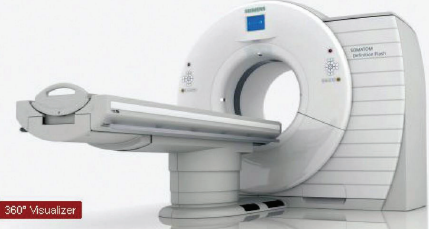CT coronary angiography
Download and print as a PDF
DownloadIntroduction
A CT (computerised tomography) scan is a special x-ray examination which allows us to take and review detailed images of the body.
CT coronary angiography is a relatively new technique, where we scan and take pictures of your heart and your coronary arteries. This allows us to see any narrowing or blockages of the arteries around your heart.
We hope this leaflet answers any questions you may have, and also to make you as comfortable as possible
throughout your visit.
How is the CT coronary angiography scan carried out?
Our radiographer will ask you to lie on a special bed. ECG leads will be placed on your chest so that we can synchronise the scanner with your heartbeat. We can then trigger the scanner to take a picture at
a certain point of your heartbeat. The bed moves through the scanner and pictures of your heart and arteries are taken.
So that we can see your heart and arteries clearly we will give you an injection of a contrast (sometimes called dye) into a vein at the front of your elbow. The dye travels through your veins to your heart, and ‘highlights’ your heart when we take the scan. It is harmless and will pass out of your body in due course.
If your heart is beating quickly, it can be difficult for us to get a clear picture. We will therefore check your heart rate when you first arrive in the department and, if it is faster than the ideal rate, we may give you some medication to slow it down. This may be either in the form of a tablet or injection.
Therefore, it is advisable to avoid driving or cycling to and from your appointment, as this medication can make you drowsy.
It is a good idea to ask someone to come with you to the appointment if you can.

Preparation for the scan
You do not need to make any special preparations for a CT coronary angiography scan, you can eat as normal, and should continue to take any medication you have been prescribed. However...
- If you are diabetic and taking the drug metformin, you should contact the CT department in advance of your scan – see appointment letter for contact details.
- If you are asthmatic and use an inhaler please bring it with you to your appointment.
Also, please avoid tea and coffee on the day of your scan. These both contain caffeine, which can speed up your heart rate. After your scan, you will be able to return to your normal daily routine.
How long will the scan take?
The CT scan itself should only take around 15 minutes. At some point during the scan we will ask you to hold your breath-this will be for no longer than 15 seconds. This again helps us to get a clear picture of your heart – when you breathe, your body moves, and so can ‘blur’ the images that we take.
We will practice the breath hold with you before your scan, and go through exactly what to expect during the
procedure.
Are there alternatives to a CT coronary angiography scan?
Prior to the introduction of CT coronary angiography, your heart and arteries would probably have been investigated with ‘traditional’ coronary angiography. This is an ‘invasive’ procedure as it involves inserting a catheter into the heart through an artery in the leg, then injecting dye using x-rays.
CT coronary angiography, on the other hand, is non-invasive and this reduces the risk of complications.
Can't make your appointment?
If you’re unable to make your appointment for any reason, please let us know in advance. We can then give your slot to another patient. Please ring the telephone number on your appointment letter.
Where is the cardiac CT scanner?
Within the CT Department, situated on Level 5 of the hospital Tower Block, Eastern Road, BN2 5BE.
If you plan to arrive by car, the streets adjacent to the hospital offer paid parking spaces, so please remember to bring some coins. Also, whilst the scan itself typically takes around 15 minutes, it’s advisable to ensure you are legally parked for up to two hours.
This information is intended for patients receiving care in Brighton & Hove or Haywards Heath. The information here is for guidance purposes only and is in no way intended to replace professional clinical advice by a qualified practitioner.


